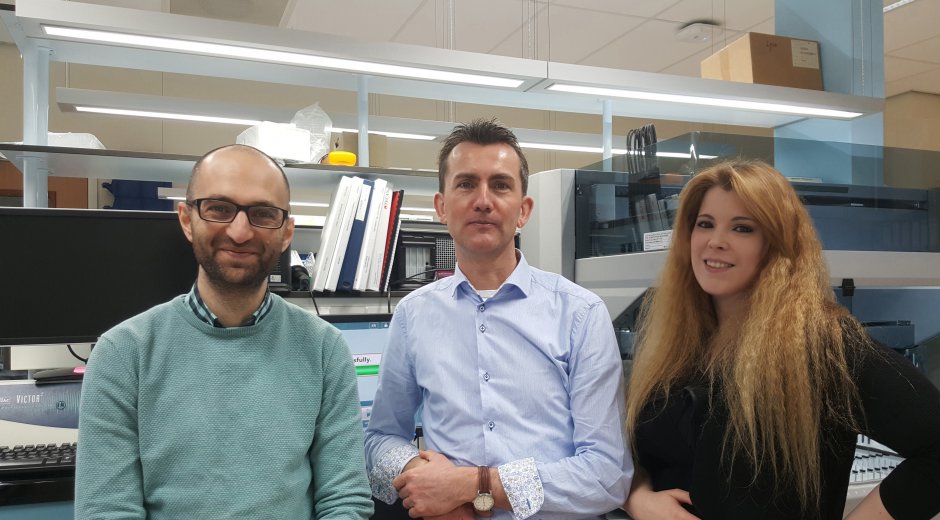
PGM1 deficiency and cardiac failure: striking a CDG to the heart
Radboud UMC
Onderzoeksleiders: Conte Federica, M.S. en Prof. Dr. Dirk Lefeber
Onderzoeksteam: Mohammad Alsady, PhD
Krachtbundelsubsidie: € 21.400 waarvan €4.445 Ride4Kids en € 16.855 Stofwisselkracht
Startdatum: 1 februari 2019
Looptijd: 14 maanden
PGM1 deficiëntie is een recentelijk opgespoorde stofwisselingsziekte. Bij PGM1 deficiëntie mist het enzym phosphoglucomutase 1 (PGM1), dat een belangrijke rol speelt in meerdere stappen in de suikerhuishouding. Het enzym verzorgt de omzetting tussen glucose 1-fosfaat en glucose 6-fosfaat. Naast deze functie in de glucose huishouding, hebben we ontdekt dat bij PGM1 deficiëntie ook de galactose huishouding verstoord is, waardoor de inbouw van galactose in eiwitten beperkt is. Het feit dat PGM1 bij meerdere metabole routes een rol speelt komt ook terug in het klinisch beeld, dat erg heterogeen is. Patiënten kampen bijvoorbeeld naast de spierpijn en spierzwakte ook met leverafwijkingen, lage bloedsuikerspiegels, groeivertraging, en vertraagde puberteit. Een gespleten huig is het enige symptoom dat bij ~80% van de patiënten al bij de geboorte aanwezig is en makkelijk te herkennen is door goed in de mond te kijken. Naast deze veelheid aan symptomen komt bij een groot deel van de patiënten ook hartfalen voor, wat tot nu toe de belangrijkste oorzaak is voor vroegtijdig overlijden. Door het ontbreken van een goed modelsysteem begrijpen we het mechanisme van hartfalen echter nog niet.
Dankzij de bijdrage van Stofwisselkracht kunnen we nu PGM1 deficiënte hartspiercellen maken zonder invasieve-ingreep. Hiermee kunnen we het ziektemechanisme in het hart onderzoeken om op basis daarvan een behandelingsstrategie te ontwikkelen. Dit is van groot belang om uiteindelijk patiënten al in een vroeg stadium te kunnen behandelen voordat ernstige hartsymptomen ontstaan, die leiden tot hartfalen en vroegtijdig overlijden.
The main obstacle for research in the field of multi-organ disorders is represented by the lack of appropriate tissue models to investigate and understand the development of the disease and the effects of treatments on a molecular level. This is also the case of phosphoglucomutase 1 (PGM1) deficiency, a metabolic congenital disorder that affects skeletal muscles, bones, glands, liver and heart. Although cardiac failure due to dilated cardiomyopathy represents the most severe symptom and the only cause of premature death in PGM1-deficiency, it remains the least known symptom due to the impossibility for researchers to obtain cardiac tissue for experimental studies for a number of ethical, safety and technical reasons. Nowadays new cellular engineering technologies, like cell reprogramming, can help us to overcome this major obstacle. Cellular reprogramming is a technique that allows to obtain stem-like cells, named induced pluripotent stem cells (iPSCs), from patients’ adultskin cells obtainable with a non-invasive procedure, and to artificially differentiate them into cardiac cells. In other words, with this technology we can obtain cardiac cells from patients without the need of cardiac surgery or invasive biopsies. In the frame of PGM1-deficiency, the aim of this project is to establish the first iPSC-derived cardiac model to investigate in a tissue-specific manner the biochemical and functional progression of cardiac symptoms of this disease and to evaluate the effects of traditional and potential new treatments, to ultimately design therapeutic strategies for preventing cardiac failure and premature death in PGM1 patients.
Overig nieuws
Druggable Targets In Lysosomal V-ATPase Dysfunction-DETAILED
Universiteit Utrecht en UMC Utrecht Onderzoeksleiders: Dr....
Classic late-infantile neuronal ceroid lipofuscinosis (CLN2) in the Netherlands- incidence and efficacy of intra-cerebroventricular enzyme replacement
Sophia Kinderziekenhuis | UMC Erasmus Onderzoeksleiders: Dr. Hidde...
Screening for novel metabolic pathways: identification of novel genes and therapeutic targets for CDG and dystroglycanopathy
Radboud UMC Onderzoeksleider: Dr. Mohammad Alsady Onderzoeksteam: Prof....